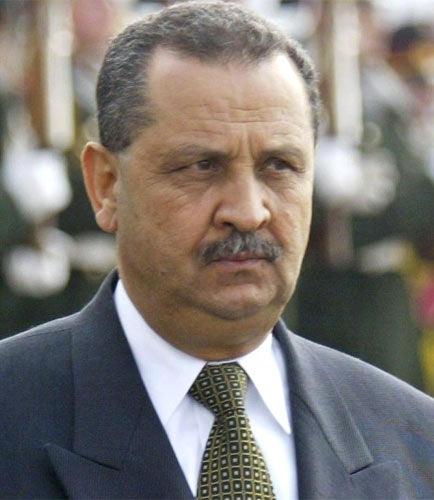Libya's oil chief 'defects from Gaddafi regime and joins rebels'

Libya's leading oil executive was reported yesterday to have defected to the rebels fighting to overthrow Colonel Muammar Gaddafi, as officials of the regime travelled to Moscow to push for an end to the Nato bombing which saw more government buildings set ablaze overnight.
News agencies reported that the head of Libya's National Oil Corporation, Shokri Ghanem, had defected from the Gaddafi government and fled to Tunisia. If confirmed it would represent a blow to Colonel Gaddafi. Many Libyan oilfields are in rebel-held territory, and it is estimated that the country has lost two-thirds of its oil output since the uprising began three months ago.
The government, however, insisted that Mr Ghanem, 68, was simply travelling. "I have no news that he has resigned or defected or something," an official in Tripoli told Reuters news agency. "Part of his job is to travel and deal with oil companies. So we have not heard anything beyond that."
In Moscow, the Russian Foreign Minister, Sergey Lavrov, called on the Gaddafi regime to stop using force against civilians and to allow the United Nations to deliver humanitarian aid. But even as the International Criminal Court issued warrants for the arrest of Colonel Gaddafi, one of his sons and the head of Libyan intelligence, the Kremlin stopped short of asking the long-standing leader to step down.
Instead, Mr Lavrov urged both sides to agree on a ceasefire, an end to Nato bombing raids and the introduction of international observers for talks about the political future of Libya. "We support the efforts to persuade all conflicting parties that there is no military outcome to the situation," he said after meeting the unnamed representatives from Tripoli in Moscow.
He said the Libyans had expressed a willingness to consider the "road map" to peace proposed by the African Union if the Nato bombing stops. However, this road map – and any solution that does not involve the departure of Colonel Gaddafi – has already been rejected by the rebels, who say many previous proclamations of a ceasefire have proved to be false.
Russia has a general policy of not supporting sanctions or armed intervention under almost any circumstances, and from the start has been wary about Nato's bombing raids. But Moscow's position has been muddied by an unprecedented split between the President, Dmitry Medvedev, and the Prime Minister Vladimir Putin. Mr Putin referred to the Nato bombing as reminiscent of the Crusades, only to be criticised by Mr Medvedev, who said such language was "unacceptable".
Russia has been a trading partner of Libya and had billions of pounds of weapons contracts with the Gaddafi regime. Russia's ambassador to Tripoli was recalled by Mr Medvedev after he said that failure to oppose the Nato bombing was a "betrayal" of Russian interests. Unclear how to act in a rare moment of discord between the country's leading statesmen, most Russian politicians have stayed quiet on the matter.
Mr Lavrov denied that Russia was looking to become the major mediator between Tripoli and the rebels, but his receiving the delegation shows that the Kremlin feels there is a chance to re-assert influence in the country. Mr Lavrov said a delegation from the rebel-controlled east of the country was also due in Moscow later this week.
Early yesterday, Nato jets pounded two government buildings in the Libyan capital, including the Interior Ministry, and set them on fire.
Join our commenting forum
Join thought-provoking conversations, follow other Independent readers and see their replies
Comments
Bookmark popover
Removed from bookmarks